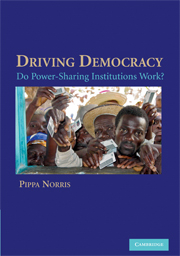Book contents
- Frontmatter
- Contents
- List of Tables
- List of Figures
- Preface and Acknowledgments
- PART I DO POWER-SHARING REGIMES WORK?
- PART II THE IMPACT OF POWER-SHARING INSTITUTIONS
- PART III CONCLUSIONS
- 9 What Works? Lessons for Public Policy
- Technical Appendix: Description of the Variables and Data Sources
- Notes
- Select Bibliography
- Index
9 - What Works? Lessons for Public Policy
Lessons for Public Policy
Published online by Cambridge University Press: 05 September 2012
- Frontmatter
- Contents
- List of Tables
- List of Figures
- Preface and Acknowledgments
- PART I DO POWER-SHARING REGIMES WORK?
- PART II THE IMPACT OF POWER-SHARING INSTITUTIONS
- PART III CONCLUSIONS
- 9 What Works? Lessons for Public Policy
- Technical Appendix: Description of the Variables and Data Sources
- Notes
- Select Bibliography
- Index
Summary
In conclusion, what are the implications of this study for comparative research in the social sciences seeking to understand processes of democratization, as well as for practical reformers, NGOs, and agencies in the international community actively engaged in peace building and promoting democracy? This chapter summarizes the main findings developed throughout the book, and it considers further issues which skeptics could raise in response to the argument. One potential methodological criticism concerns the dangers of self-selection bias in the cases used for illustration and whether this invalidates the evidence. In addition, are power-sharing constitutions a practical and viable reform which should be advocated by domestic reformers and the international development community, as an effective strategy with a realistic chance of success? There are many reasons for caution about this claim. In particular, it should be emphasized that many alternative political reforms should also be implemented, beyond those discussed within this study; opportunities for major constitutional reform often remain extremely restricted; the odds of success in generating durable ends to civil wars are daunting; and the conditions of deep-rooted poverty and fragile states make democratic development through power-sharing agreements extremely challenging. Reflecting upon these issues provides insights into the fundamental role, and also limits, of institutional reforms.
THE IMPACT OF POWER-SHARING ARRANGEMENTS
Power-sharing arrangements are understood here to include four features as the basic building blocks, used singly or in combination.
- Type
- Chapter
- Information
- Driving DemocracyDo Power-Sharing Institutions Work?, pp. 209 - 224Publisher: Cambridge University PressPrint publication year: 2008



